|
Michigan Power Shovel Company During World War Two
Benton Harbor, MI
1930-1953 as Michigan Power Shovel subsidiary of Ross Carrier Company
1953-1985 as the Construction Machinery Division of the Clark Equipment
Company
This page added
11-1-2023.
It was announced on September 27, 1930, that
the Ross Carrier Company of Benton Harbor, MI had purchased the Detroit
Power Shovel Company of Detroit, MI and was moving the operation to the
Ross plant in Benton Harbor. H.B. Ross, President of Ross Carrier,
was named the chairman of the newly renamed Michigan Power Shovel
Company, which was operated as a subsidiary of Ross Carrier. Both
companies were co-located in the same factory at 331 Miller Street, now
Water Street, in Benton Harbor.
The Michigan Power Shovel Company built and
marketed both tracked and truck mounted cranes. The company was
the first to build its own carriers for the line of truck cranes it
produced. This was done as it was found that commercial truck
chassis were not strong enough to keep the frames from warping and
bending under the loads placed on them by the cranes in operation.
In 1953, the Michigan Power Shovel Company was
sold to the Clark Equipment Company and operated as the Clark-Michigan
Company. The Michigan brand of construction equipment began to go
away in 1985 when Clark-Michigan was merged into the Volvo Company.
By 1995 the Michigan name was gone.
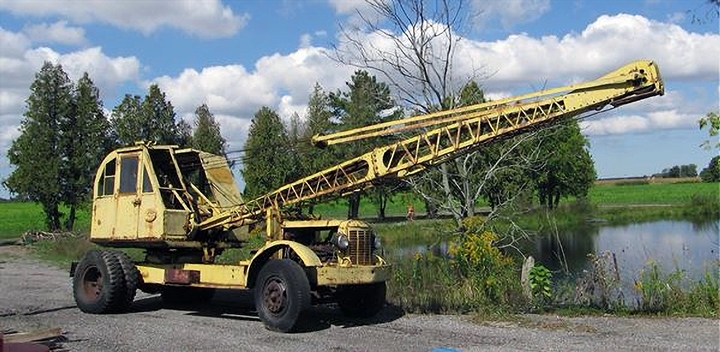
This and the following image show a 1934
Michigan Power Shovel Company Model TD-6 truck crane. It is
mounted on a carrier chassis built by Michigan Power Shovel to its own
specifications. This is one of the many pieces of construction
equipment on display at the Historical Construction Equipment
Association outside of Bowling Green, OH. Image courtesy of the
Historical Construction Equipment Association.
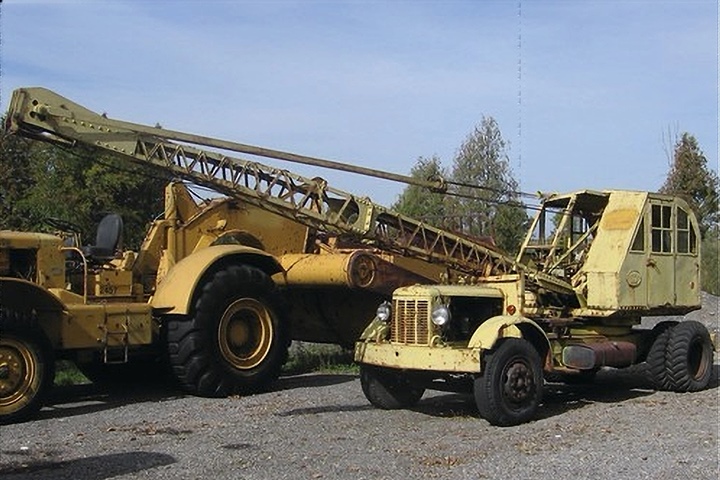
Image courtesy of the Historical
Construction Equipment Association.
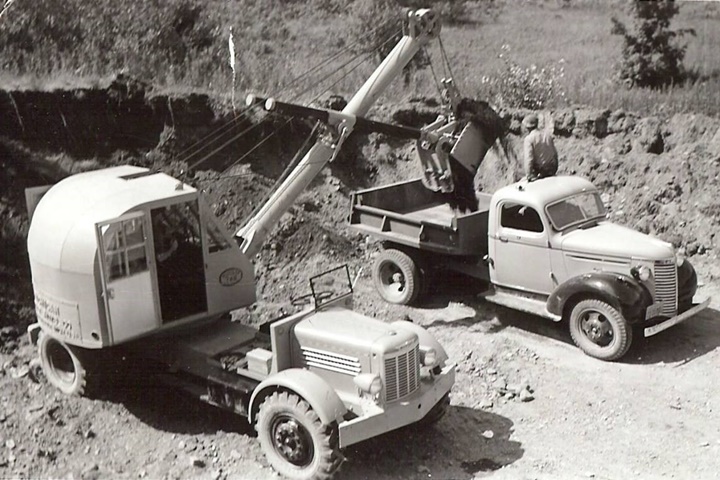
The Michigan Power Shovel TD-6 series truck
cranes were mounted on 4x2 chassis with an open cab. Image
courtesy of Frank Paris via Jeff Lakaszcyck.
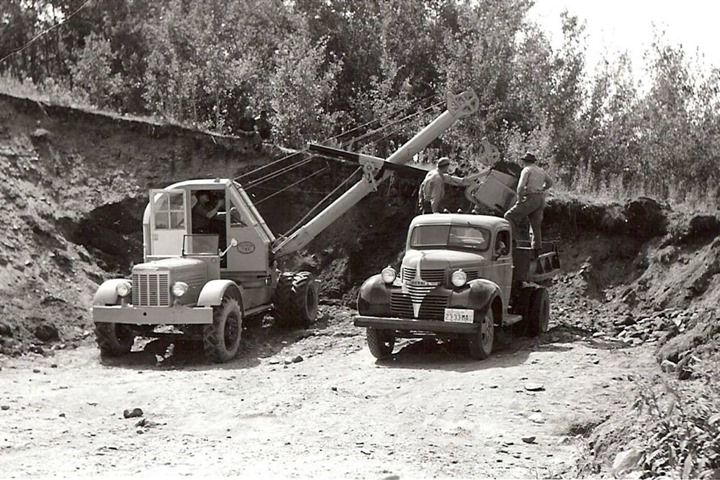
Image courtesy of Frank Paris via Jeff Lakaszcyck.
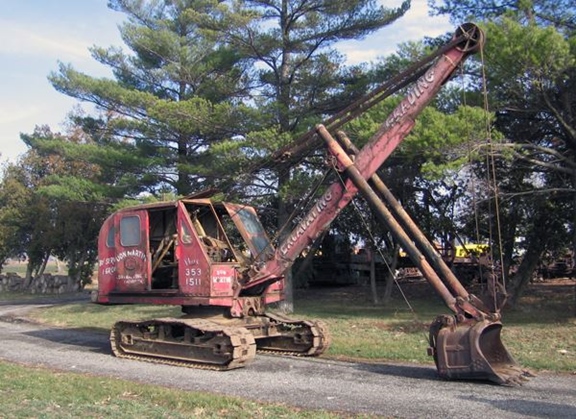
The company also manufactured track mounted
power shovels. This 1950 C16 power shovel is also part of the
collection at the Historical Construction Equipment Association.
Image courtesy of the Historical Construction Equipment Association.
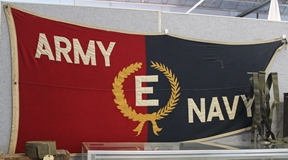
The Michigan Power Shovel Company won the
Army-Navy "E" Award twice during World War Two.
The first award was presented to the company on February 6, 1945.
The announcement of the second award was made on July 28, 1945,
just two weeks prior to the end of World War Two.
Both the Michigan Power Shovel Company and its
parent company, Ross Carrier Company, received their "E" awards at the
same time. 600 employees from both companies were at the award
ceremony.
Ross Carrier Company had $17,494,000 in major
contracts during World War Two and Michigan Power Shovel had $10,049,000
or 36% of the total $27,543,000 contract between the two companies.
Assuming the employees were divided between the two companies based on
the percentage of contracts, the Michigan Power Shovel Company had 216
workers in February 1945.
Michigan Power Shovel Company
World
War
Two
Production: The company had
$10,049,000 in major contracts during World War Two. It
supplied excavators, cranes and truck cranes to the U.S. Treasury, the
Army Corps of Engineers, the United States Army Air Forces, and the U.S.
Navy. Table 1 below
shows all of the major contracts.
The Michigan Power Shovel Company built an
estimated 556 complete crane trucks and 255 cranes only for use on the
Biederman Motor Corporation's P-1 truck crane.
Table 1 - American Power Shovel
Company's
Major World War Two Contracts
The information below
comes from the "Alphabetical Listing of Major War Supply
Contracts, June 1940 through September 1945." This was
published by the Civilian Production Administration,
Industrial Statistics Division. |
|
Product |
Contract Number |
Contract Amount |
Contract Awarded
|
Completion
Date |
| Excavators - U.S.
Treasury |
TPS-2327L |
$318,000 |
11-1941 |
3-1942 |
| Excavators - U.S.
Treasury |
TPS-4934L |
$77,000 |
2-1942 |
8-1942 |
| Tools - Army
Corps of Engineers |
978-ENG-4909 |
$274,000 |
3-1942 |
10-1942 |
| Trucks - USAAF |
535-AC-26207 |
$222,000 |
3-1942 |
7-1942 |
| Cranes - U.S.
Treasury |
TPS-8238L |
$325,000 |
5-1942 |
11-1942 |
| Cranes - Navy |
NOS-10189 |
$52,000 |
7-1942 |
12-1942 |
| Crane Parts -
U.S. Treasury |
TPS-15466L |
$84,000 |
8-1942 |
10-1942 |
| Cranes - Navy |
NOM-38582 |
$59,000 |
12-1942 |
3-1943 |
| Cranes - USAAF |
535-AC-35271 |
$357,000 |
1-1943 |
6-1943 |
| Cranes - Army
Corps of Engineers |
1088-ENG-2212 |
$353,000 |
2-1943 |
12-1943 |
| Cranes - Army
Corps of Engineers |
1088-ENG-2490 |
$220,000 |
4-1943 |
12-1943 |
| Cranes - Army
Corps of Engineers |
1088-ENG-2579 |
$553,000 |
5-1943 |
6-1944 |
| Cranes - Army
Corps of Engineers |
1088-ENG-2690 |
$70,000 |
5-1943 |
6-1943 |
| Cranes - Army
Corps of Engineers |
47013-ENG-10 |
$572,000 |
10-1943 |
12-1944 |
| Crane Trucks -
Army Corps of Engineers |
47013-ENG-11 |
$885,000 |
11-1943 |
11-1944 |
| Truck Cranes -
Navy |
QM-42467 |
$158,000 |
12-1943 |
10-1944 |
| Truck Cranes - USAAF |
20017-AC-680 |
$2,041,000 |
1-1944 |
12-1945 |
| Truck Mounted
Cranes - Army Corps of Engineers |
47013-ENG-409 |
$2,362,000 |
4-1944 |
12-1945 |
| Truck Cranes -
Navy |
QM-45732 |
$113,000 |
7-1944 |
11-1945 |
| Crane Parts -
USAAF |
33038-AC-7811 |
$90,000 |
1-1945 |
11-1945 |
| Truck Cranes -
Army Corps of Engineers |
11114-ENG-1364 |
$864,000 |
2-1945 |
6-1946 |
|
Total |
|
$10,049,000 |
|
|
Table 2 below has grouped the value of the
contracts by customer, which shows the Army Corps of Engineers was
Michigan Power Shovels biggest customer of World War Two with 61.2% of
the contracts. This table includes spare parts along with the
crane trucks and excavators.
|
Table 2 - American Power Shovel
Company's
Major World War Two Contracts by Customer |
|
Customer |
Total Contract Value |
Number of Contracts |
Percentage |
|
Army Corps of Engineers |
$6,153,000 |
9 |
61.2% |
| USAAF |
$2,710,000 |
4 |
26.7% |
|
U.S. Treasury |
$804,000 |
4 |
8% |
|
Navy |
$382,000 |
4 |
3.8% |
|
Total |
$10,049,000 |
21 |
99.7% |
Table 3 below has
removed the spare parts contracts from the listing.
|
Table 3 - American Power Shovel
Company's
Major World War Two Excavator and Truck Crane/ Crain Contracts
by Customer |
|
Customer |
Total Contract Value |
Number of Contracts |
Percentage is this needed? |
|
Army Corps of Engineers |
$5,879,000 |
8 |
61.2% |
| USAAF |
$2,620,000 |
3 |
27.3% |
|
U.S. Treasury |
$720,000 |
3 |
7.4% |
|
Navy |
$382,000 |
4 |
3.9% |
|
Total |
$9,601,000 |
18 |
99.8% |
Table 4 is from the
"Quick-Way" Truck Shovel Company page of this website.
Included in Table 4 is information that allows the calculation of
the average cost of a similar type truck mounted crane. The
cranes in Table 4 were purchased for installation on both Brockway
and FWD truck chassis during World War Two. This assumes that
all of the vehicles purchased on the contracts were shovel trucks.
|
Table 4 - "Quick-Way" Truck
Shovel Company's Crane Serial Number and Unit Cost |
|
Product - Customer |
Contract Number* |
Contract Amount |
Serial
Numbers |
Number Built |
Unit Cost |
| Cranes - Army
Engineers |
1088-ENG-2016 |
$930,000 |
1755
Thru 1859 |
105 |
$8,857 |
| Cranes - Army
Engineers |
1088-ENG-2243 |
$819,000 |
1860
Thru 1955 |
96 |
$8,531 |
| Cranes - Army
Engineers |
5016-ENG-51 |
$2,641,000 |
2140
Thru 2508 |
369 |
$7,157 |
| Cranes - Army
Engineers |
5016-ENG-187 |
$3,615,000 |
2509
Thru ? |
? |
|
|
Total |
|
$4,390,000 |
|
570 |
$7,701 |
Table 4 provides an
average cost of the crane assembly only of $7,701. This will
be rounded up to $8,000. This gives a value we can use to
calculate the number of Michigan Truck Shovel Company crane trucks
it produced during World War Two.
Table 5 provides
information on the cost of the chassis provided for the "Quick-Way"
Crane. The Brockway Motor Company provided 1,312 truck chassis
for the mounting of the "Quick-Way" crane.
|
Table 5 - Brockway Motor Company
Chassis Costs for "Quick-Way" Truck
Shovel Company's Crane |
|
Contract Number |
Contract Amount |
Number Built |
Unit Cost |
| 74-ORD-3552 |
$5,788,000 |
534 |
$10,838 |
| 30115-ORD-312 |
$6,963,000 |
630 |
$11,052 |
|
30115-ORD-1238 |
$1,340,000 |
148 |
$9,054 |
|
Total |
$14,091,000 |
1,312 |
$10,314 |
Table 5 provides an
average cost of the chassis built for the "Quick-Way" Truck Shovel
Company's Crane by the Brockway Motor Company. The average
cost over three contracts is $10,314. This will be rounded
down to $10,000. This gives a value we can use to calculate
the number of Michigan Truck Shovel Company crane trucks it produced
during World War Two.
Tables 4 and 5 provide
an average of $18,000 for the cost of a similar type of truck crane.
Using this information and assuming that all of the total contracts
in Table 3 were for both the crane and carrier for a Michigan TM-16
model truck crane, the number of this type of product delivered is
given in Table 6 below.
|
Table 6 - Estimated Number of
American Power Shovel Company Truck Shovels Produced During
World War Two. |
|
Customer |
Total
Contract Value |
Estimated
Number Built |
|
Army Corps of Engineers |
$6,153,000 |
341 |
| USAAF |
$2,710,000 |
150 |
|
U.S. Treasury |
$804,000 |
44 |
|
Navy |
$382,000 |
21 |
|
Total |
$10,049,000 |
556 |
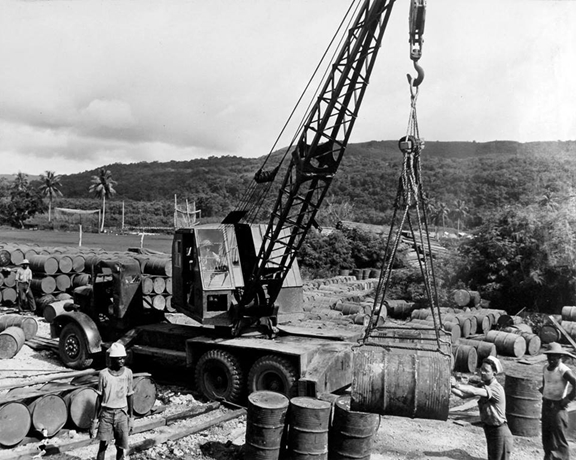
Here is one of the estimated 21 U.S.
Navy Michigan Power Shovel truck cranes in use by navy stevedores.
Palm trees in the background suggest this is in the south Pacific.
Image courtesy of Andre Margage via Jeff Lakaszcyck.
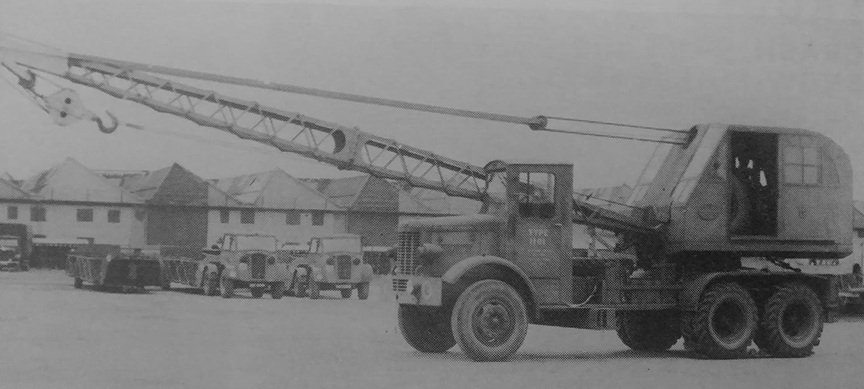
The trucks in the background are of
British manufacture, suggesting this is at a base in England or in a
Commonwealth country. In the foreground is a TM-16 crane truck
built by Michigan Power Shovel in Benton Harbor, MI. Image
courtesy of Andrew Vecchio via Jeff Lakaszcyck.
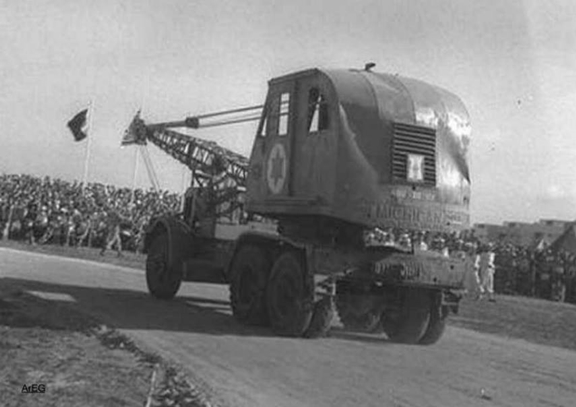
This post 1948 era photo shows this
Israeli TM-16 at a gathering of some sort. Image courtesy of
Andre Margage via Jeff Lakaszcyck.
Biederman Motors
Corporation P-1 Crane Truck:
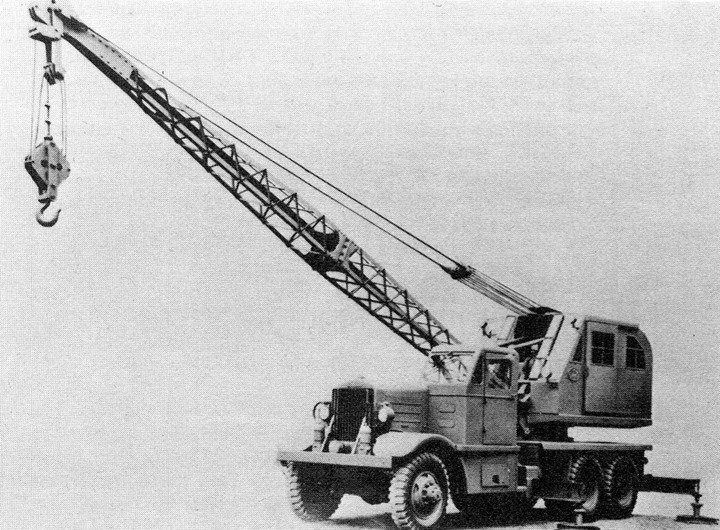
The Biederman Motors Corporation
P-1 truck with a Michigan Power Shovel Company crane.
Biederman was awarded
two contracts by the United States Army Air Forces to produce crane
trucks equipped with the Michigan Power Shovel TM-16. These
contracts are shown in Table 7 below. The first contract, 20017-AC-679,
was awarded in January 1944. In Table 8, the USAAF awarded the
Michigan Power Shovel Company contract 20017-AC-680 for truck
cranes. Note that the two contracts are successive contracts.
The USAAF awarded Biederman a contract for the chassis of the P-1
and ordered the cranes from Michigan Power Shovel at the same time.
Table 7 - Biederman Motor
Corporation's
Major World War Two USAAF P-1 Truck Contracts
The information below
comes from the "Alphabetical Listing of Major War Supply
Contracts, June 1940 through September 1945." This was
published by the Civilian Production Administration,
Industrial Statistics Division. |
|
Product |
Contract Number |
Contract Amount
|
Contract Awarded
|
Completion
Date |
| Trucks - USAAF |
20017-AC-679 |
$2,361,000 |
1-1944 |
1-1945 |
| Trucks - USAAF |
33038-AC-8434 |
$2,269,000 |
2-1945 |
4-1946 |
| Total |
|
$4,630,000 |
|
|
Dividing our estimated
value of $8,000 for a TM-16 Michigan Crane into the $2,041,000 value
of contract 20017-AC-680 gives 255 cranes.
Table 8 - American Power Shovel
Company's Major World War Two USAAF Truck Crane Contract
The information below
comes from the "Alphabetical Listing of Major War Supply
Contracts, June 1940 through September 1945." This was
published by the Civilian Production Administration,
Industrial Statistics Division. |
|
Product |
Contract Number |
Contract Amount |
Contract Awarded
|
Completion
Date |
| Truck Cranes - USAAF |
20017-AC-680 |
$2,041,000 |
1-1944 |
12-1945 |
| Total |
|
$2,041,000 |
|
|
Excerpts from "Handbook of Instructions with Parts Catalog for Model P-1 Mobile Truck
Crane": Because the Michigan Power Shovel Company-built TM-16
mobile crane is
such an unknown, I have included the following pages from the
manual to give the reader a more in-depth understanding of this truck.
This is T. O. No. 19-40-12 dated 5 March 1945.
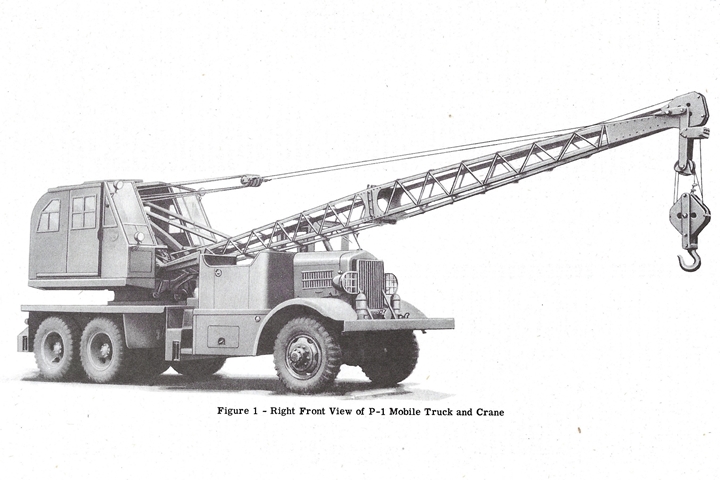
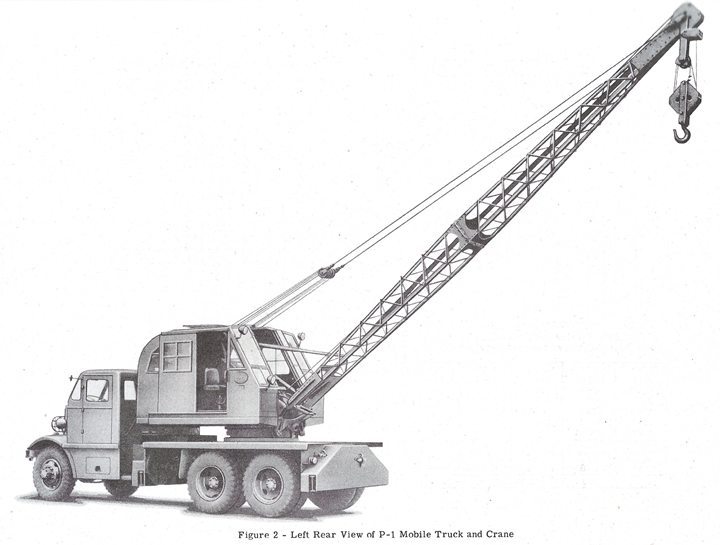
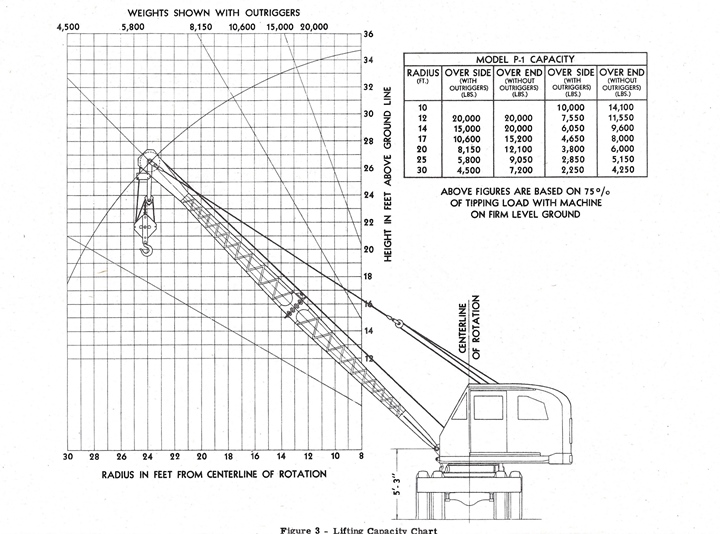
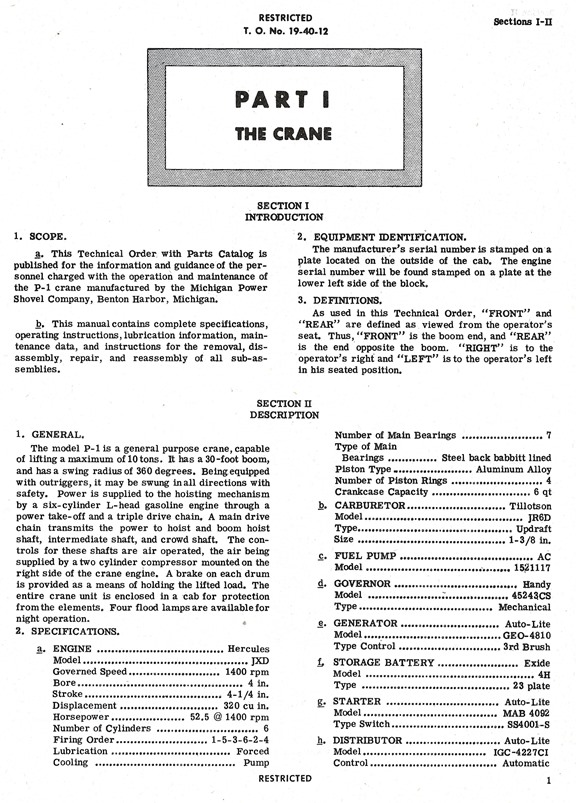
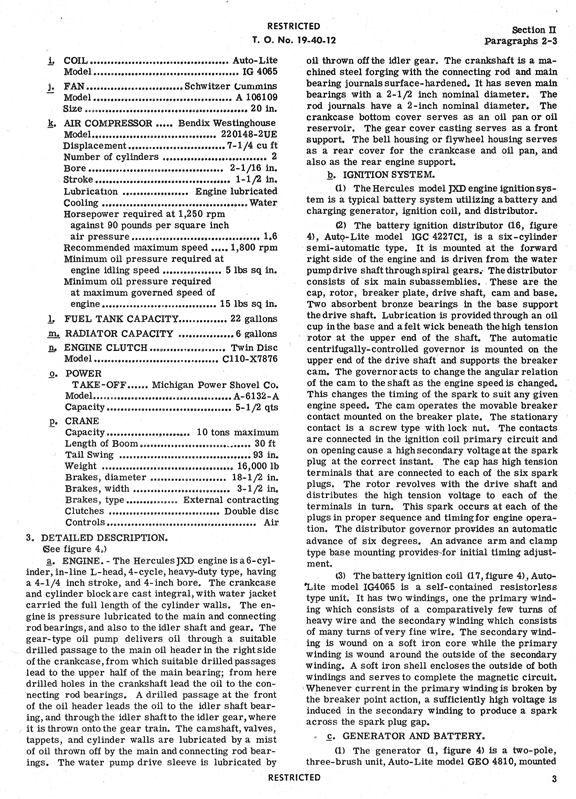
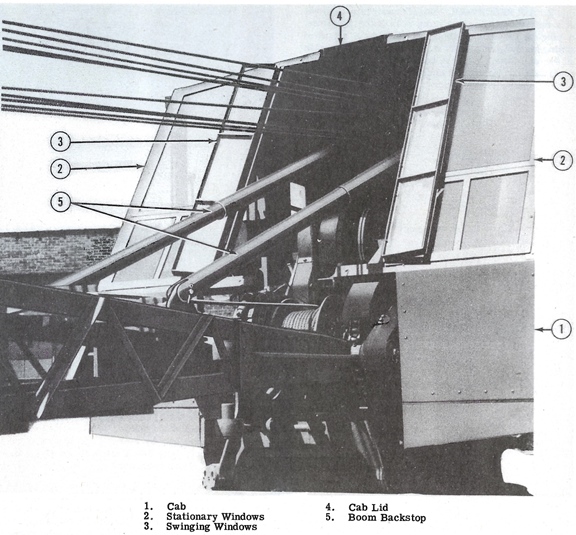
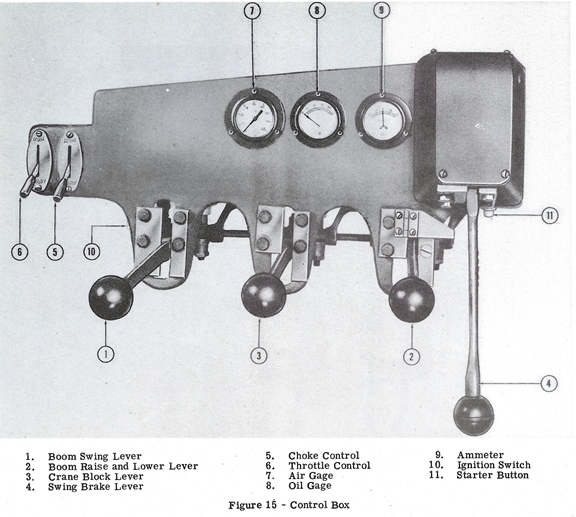
This is the top view of the control box.
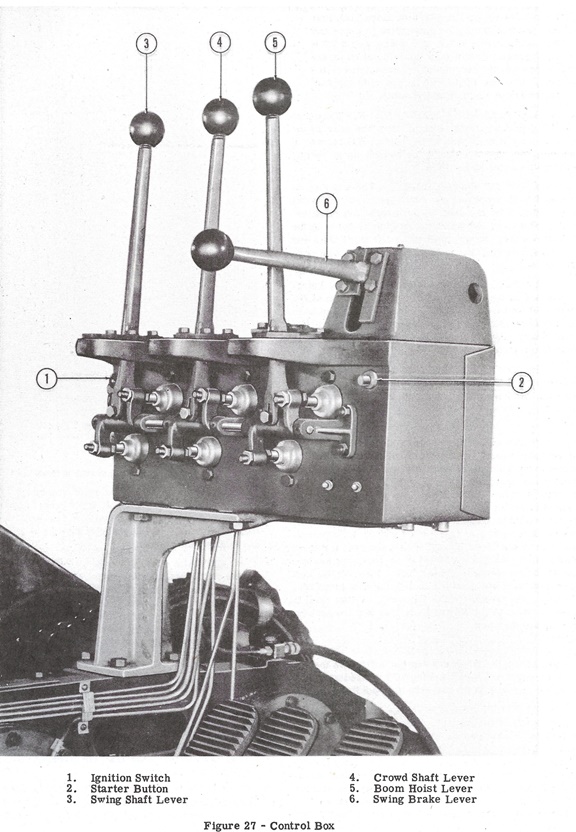
This is the side view of the control box.
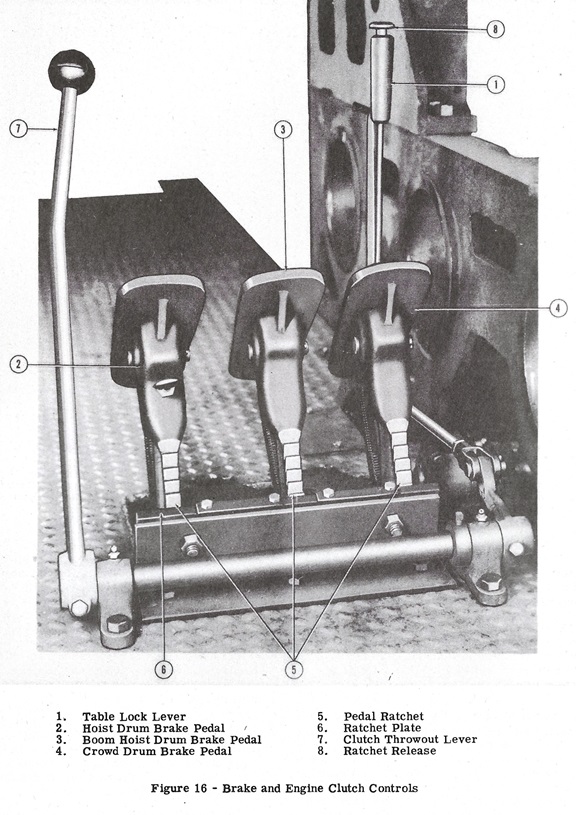
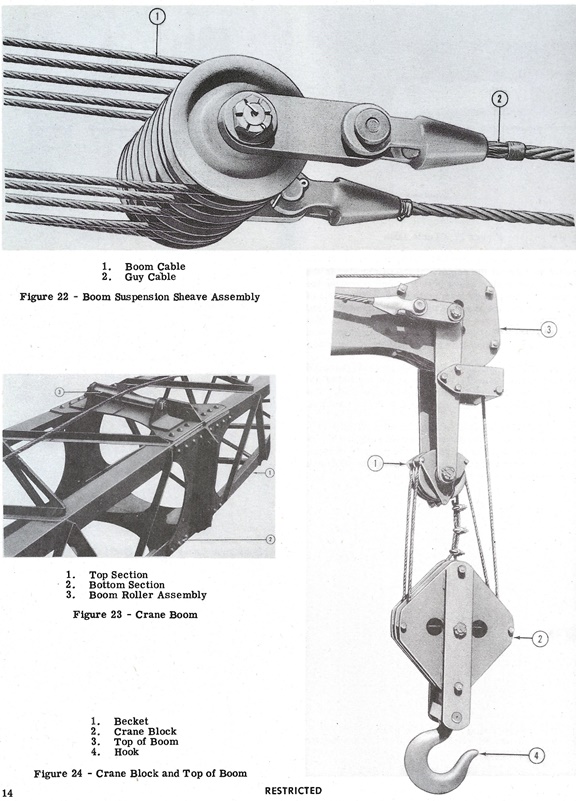
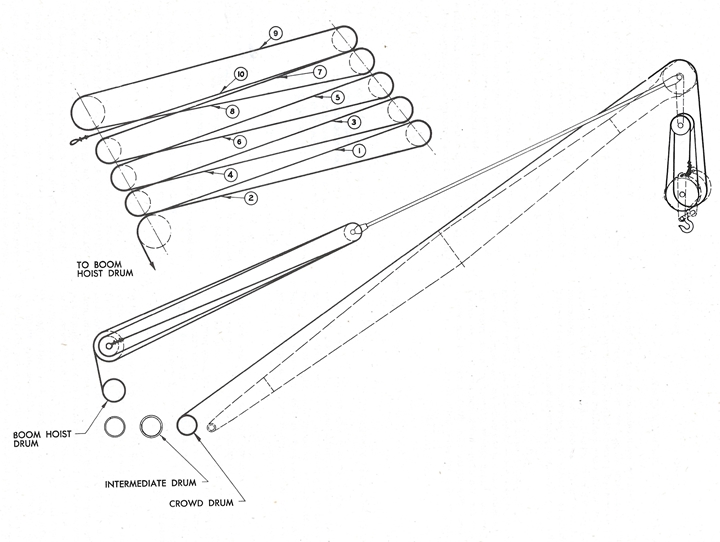
Other P-1 Information:
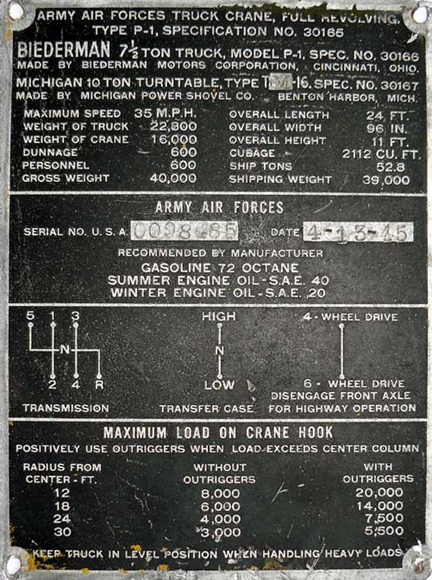 This Biederman P-1 data plate has a
USA number of 0098*85 and was built on 4-13-1945. The
information at the top of the data plate shows that the P-1s were
built for the Army Air Forces and were built by Biederman.
Photo courtesy of Jeff Lakaszcyck.
This Biederman P-1 data plate has a
USA number of 0098*85 and was built on 4-13-1945. The
information at the top of the data plate shows that the P-1s were
built for the Army Air Forces and were built by Biederman.
Photo courtesy of Jeff Lakaszcyck.
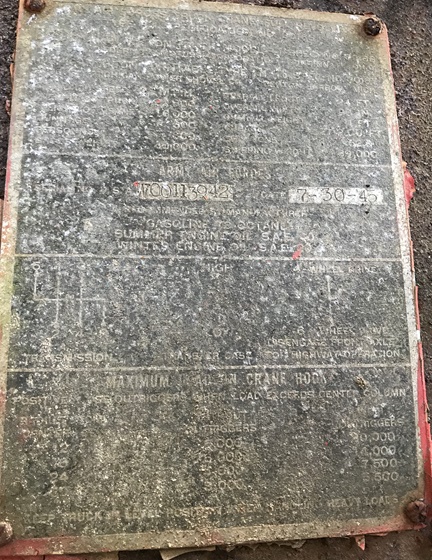
This 7-30-1945 dated data plate has a USA
serial number of W00113842. Photo courtesy of Jeff Lakaszcyck.
Surviving P-1 Crane Trucks with Michigan
Power Shovel Company TM-16 Cranes:
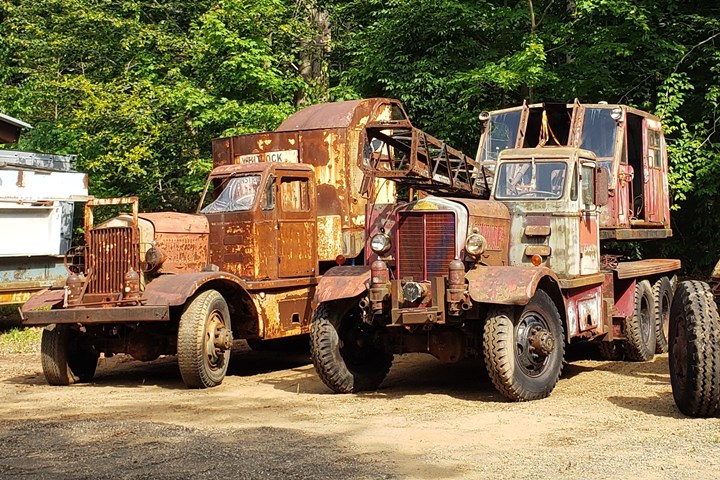
Mr. Ken Ochenkowski also owns two
P-1 crane trucks. The one on the right has a Michigan TM-16 mounted on
it. The one on the left has its original Michigan replaced with a
Insley crane. In this photo, both trucks are shown together at
Mr. Ochenkowski's facility. Warren Richardson photo via Jeff Lakaszcyck.
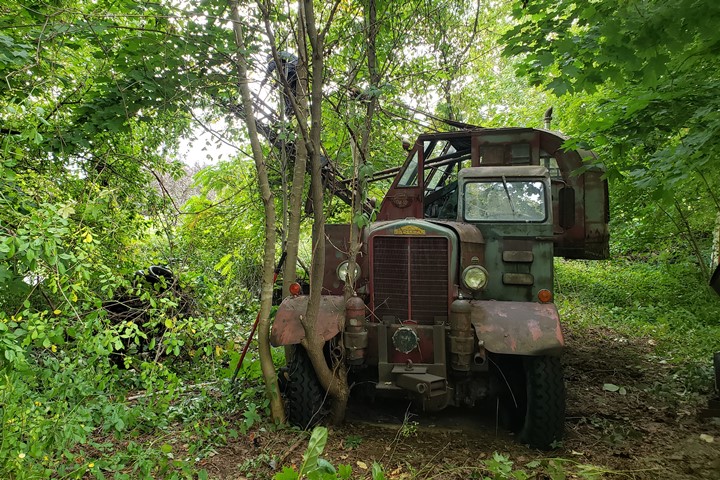
This is a view of the same P-1 crane truck
that was on the right in the above photo before it was removed from the
woods and loaded onto the low-boy trailer shown below. Photo
courtesy of Warren Richardson.
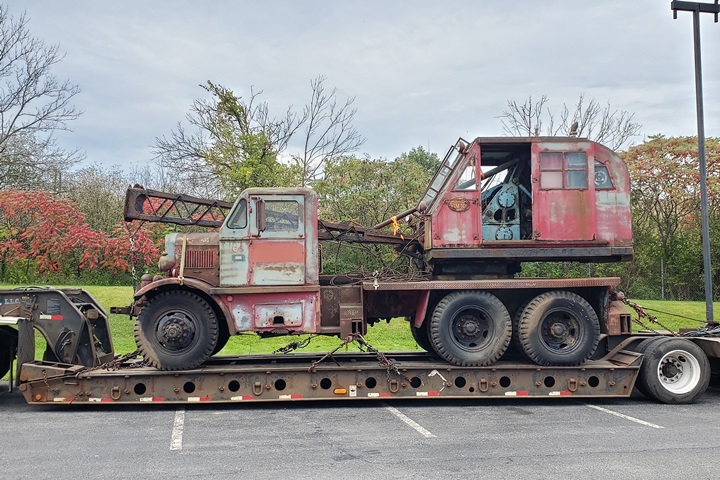
This image shows the same P-1 mounted
on a lowboy trailer. Photo courtesy of Warren Richardson.
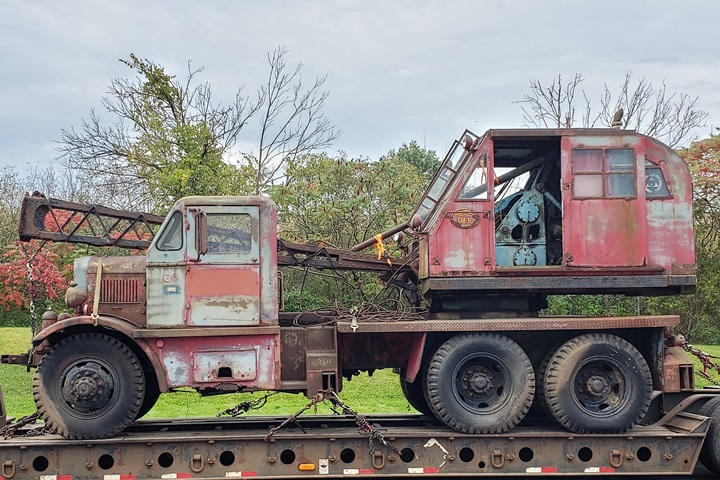
Photo courtesy of Warren Richardson.
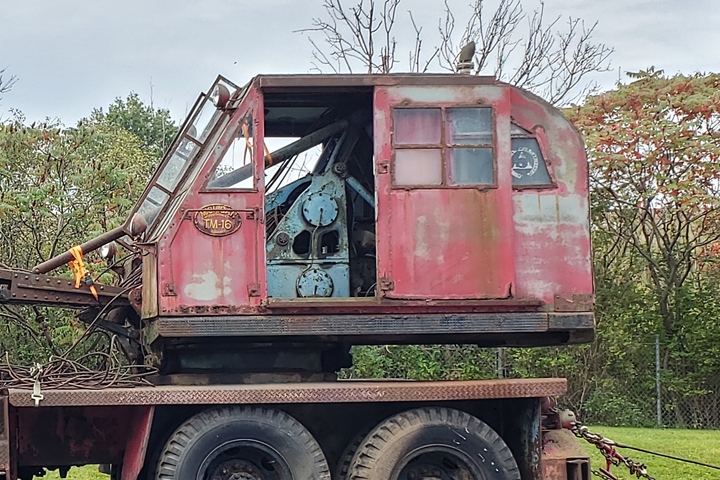
The data plate on the side of the crane shows this as a Michigan Power
Shovel Company Model TM-16. Photo courtesy of Warren Richardson.
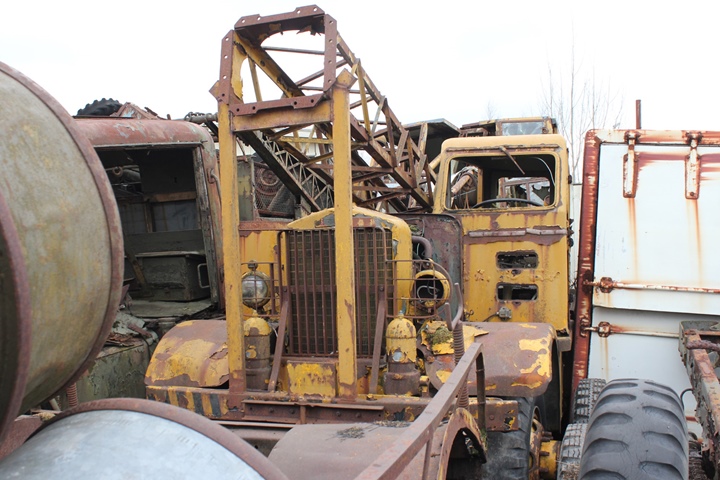
This P-1 was photographed in
Sweden. Photo courtesy of Sven Bengston via Jeff Lakaszcyck.
The Plant:
In 1930, when the Ross Carrier Company
purchased the Detroit Power Shovel Company, the local newspaper noted
that the company's location was on Miller Street.
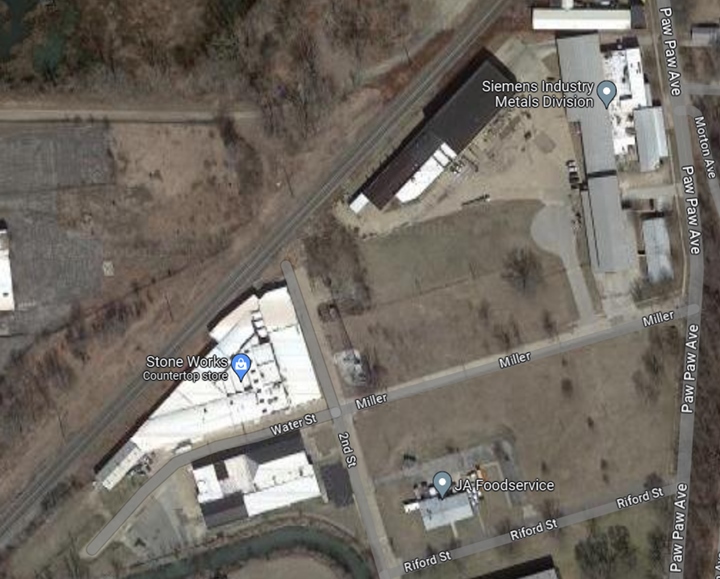
This current view of the area shows that
Miller Street runs east of 2nd Street and Water Street runs west of 2nd
Street. From this it appears that Ross and Michigan Power Crane
were located on either of the vacant fields north or south of Miller
Street. Image courtesy of Google Maps.
However, 90 years ago when Ross Carrier
and Michigan Power Shovel moved to Benton Harbor, MI Miller Street also
ran to the west of 2nd Street. Several pieces of other information
lead to this conclusion.
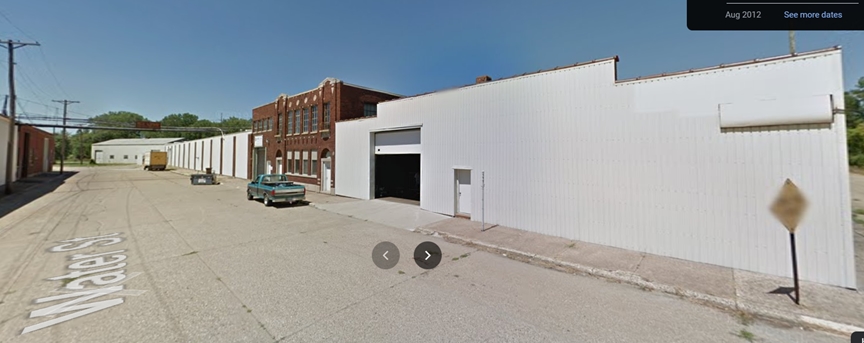
This is the current Google Maps street view
looking west down what is now labeled Water Street. As with many
old factories, much of the original brick has been covered with steel
sheet metal to cover the old brick and windows. The exception for
this is the two story building halfway down the block. Image
courtesy of Google Maps.

This small clip from an April 1942 newspaper
advertisement is the only evidence I have found that gives the exact
address of Ross Carrier, and therefore the location of the Michigan
Power Shovel Company, as the two companies were co-located in the same
facility.
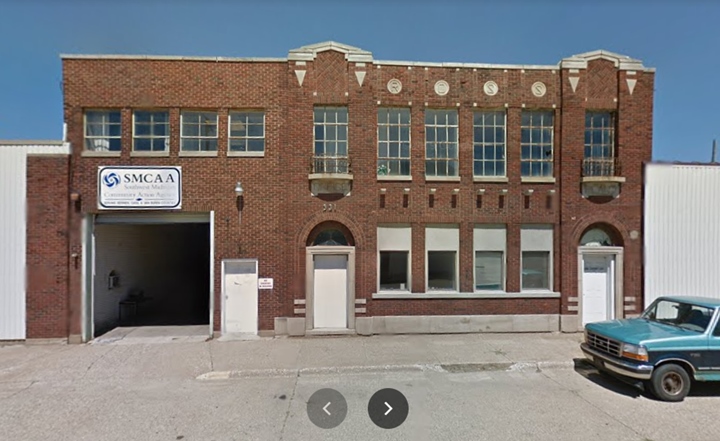
The was the office building for Ross Carrier
Company. The name Ross is spelled out in the upper right of the
building. The address on the building is 331. Image courtesy
of Google Maps.
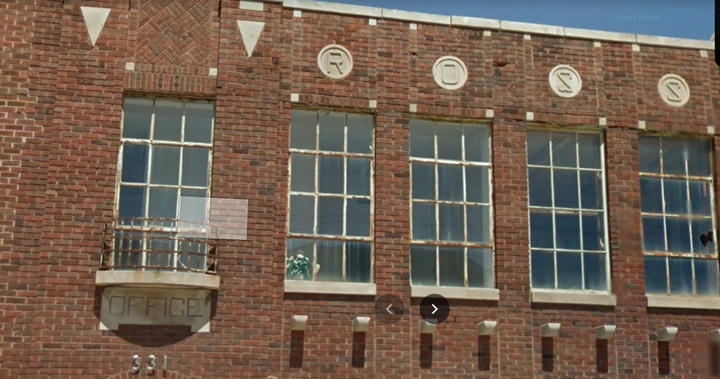
This enlarged image shows the name Ross,
the word office, and the address of 331 on the brick two story building.
Image courtesy of Google Maps.
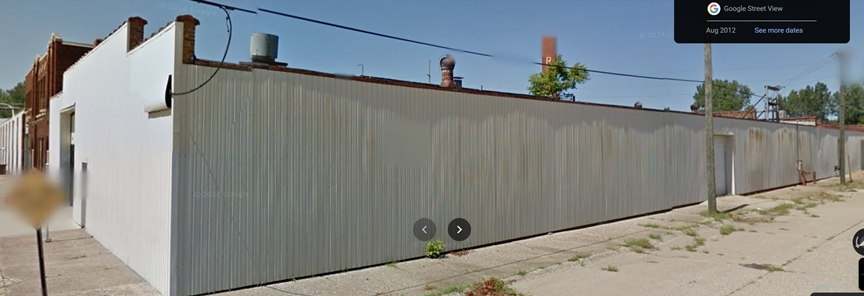
This image shows the east end looking north
along 2nd Street of the former Ross Carrier and Michigan Power Shovel
Companies factory complex. In the background the "R" in "Ross" can
be seen on the smokestack. Image courtesy of Google Maps.
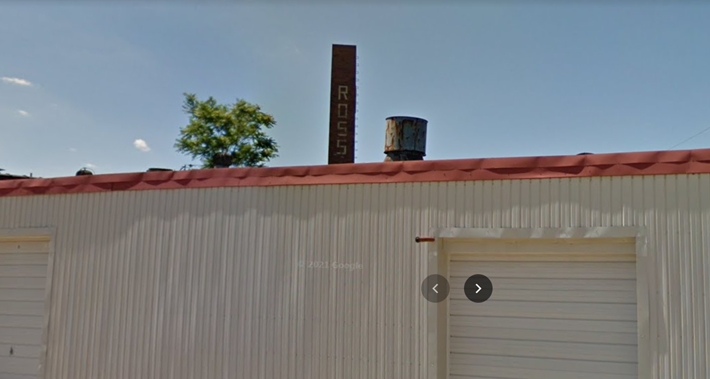
This image shows the entire name "'Ross" on
the smokestack. This image also establishes this as the location
of Ross and the Michigan Power Shovel Company at this location.
Image courtesy of Google Maps.
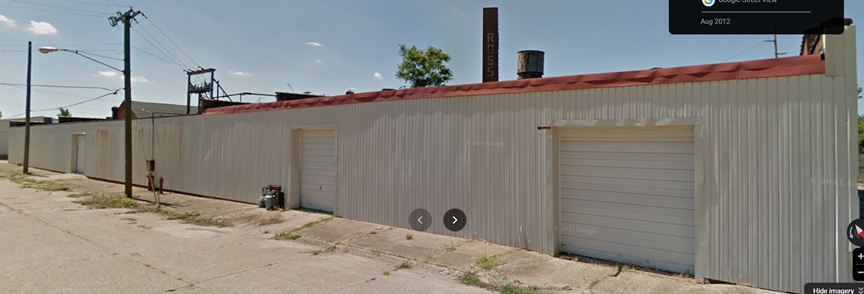
This image is looking south along 2nd Street
on the east side of the factory complex. Image courtesy of Google
Maps.
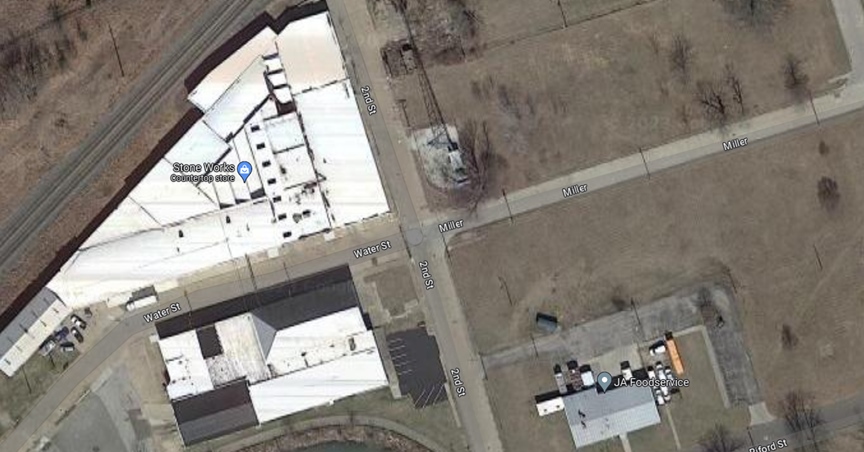
The original Ross and Michigan Power Shovel
Company plant was therefore the triangular building north of what is now
labeled as Water Street. This building had over 44,000 square feet
of floor space. Ross and Michigan Power Shovel may also have been
using the factory building across the street from the main plant.
This building encloses another 28,000 square feet of space. Image
courtesy of Google Maps.

This image is looking east along what is now
labeled as Water Street and shows the two buildings on either side of
the street. Image courtesy of Google Maps.
Post-World War Two Era Michigan Power
Shovel Company Truck Shovels:
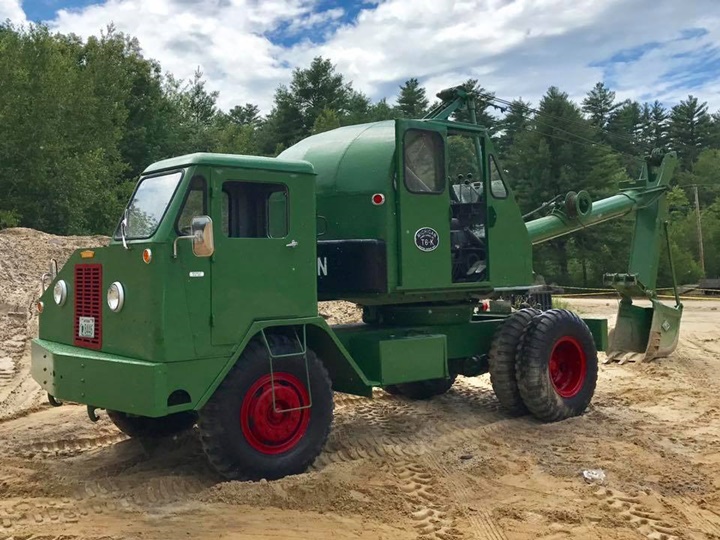
The T6-K included a closed cab. Image courtesy of George Santos via Jeff Lakaszcyck.
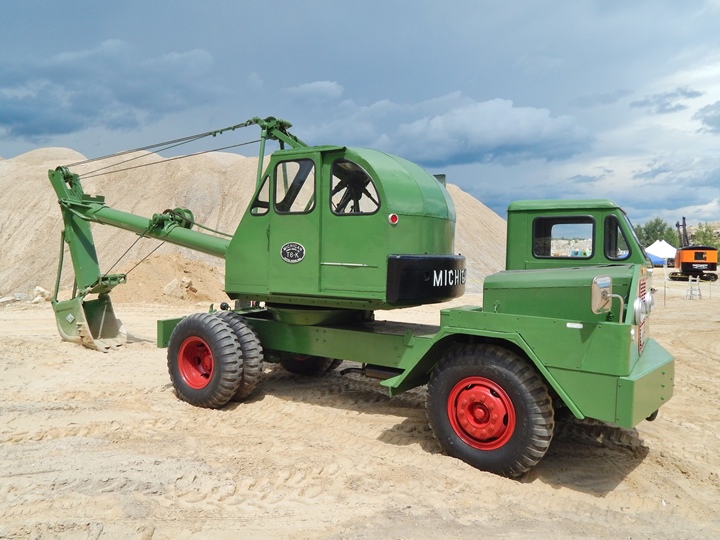
Image courtesy of Ray Darling via Jeff Lakaszcyck.
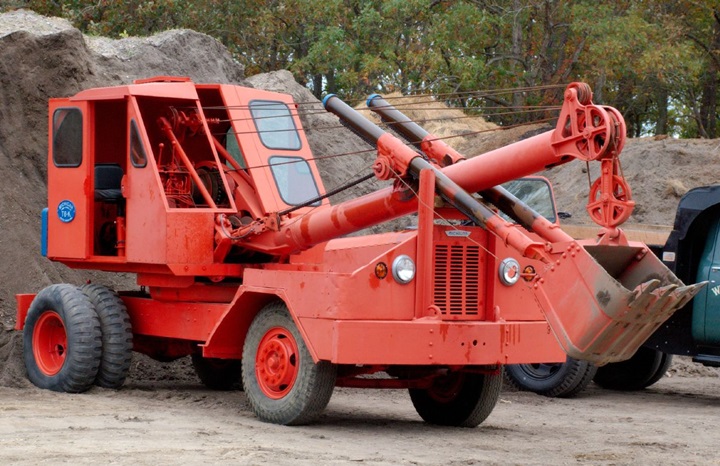
Image courtesy Jeff Lakaszcyck.
|









































